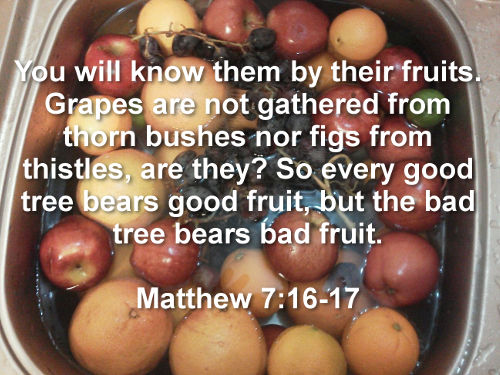Our world is one of choices. We choose our education, occupation, and even those people that we follow as we live our life in the world. We can decide many aspects of our life as long as we are focused on the God who saved the world. We need not be missionaries as long as we confess Jesus before men in our daily lives. But as we make our choices we must consider who we learn from in our spiritual matters. Jesus talked about judging the fruit of spiritual teachers.
As a warning about false teachers, Jesus says:
Beware of the false prophets, who come to you in sheep’s clothing, but inwardly are ravenous wolves. You will know them by their fruits. Grapes are not gathered from thorn bushes nor figs from thistles, are they? So every good tree bears good fruit, but the bad tree bears bad fruit. A good tree cannot produce bad fruit, nor can a bad tree produce good fruit. Every tree that does not bear good fruit is cut down and thrown into the fire. So then, you will know them by their fruits (Matthew 7:15-20).
"You will know them by their fruit", He says. How do we know the fruit? What are the markers, and what character traits are we looking for? For the next few weeks, we will look at the fruit of the Christian. We know the passage well:
But the fruit of the Spirit is love, joy, peace, patience, kindness, goodness, faithfulness, gentleness, self-control; against such things there is no law (Galatians 5:22-23).
The fruit of the Spirit is not something that need to be callous about. As you learn the fruit, memorize the passage, and start to examine what this fruit is, you will start to be able to identify a spiritual teacher as an appropriate teacher or as a false prophet.
As Paul is introducing the fruit of the Spirit, he contrasts the way of Christian living against how the world lives. He describes that the sins of the flesh are evident:
Now the deeds of the flesh are evident, which are: immorality, impurity, sensuality, idolatry, sorcery, enmities, strife, jealousy, outbursts of anger, disputes, dissensions, factions, envying, drunkenness, carousing, and things like these, of which I forewarn you, just as I have forewarned you, that those who practice such things will not inherit the kingdom of God (Galatians 5:19-21).
In general, you can look at these two lists and notice a specific contrast. The deeds of the flesh are chaos, internally-focused, and seeking instance pleasure no matter the long-term consequence. The fruit of the Spirit focuses on order, quietness, and on other people. In short, the indwelling love that Jesus gives us brings peace and order, created on the foundation of love.
In the next several weeks, we will examine each fruit in turn and determine what qualities would show the fruit of the Spirit and what qualities show the deeds of the flesh. We will then use this as a guide to determine if we are gathering our learning about the Christian faith from true teachers or from false prophets.
